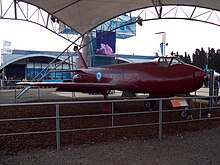FMA I.Ae. 27 Pulqui I
| IAe 27 Pulqui I | |
|---|---|
 The I.Ae. 27 Pulqui I prototype at Moron airfield | |
| General information | |
| Type | Experimental jet |
| Manufacturer | Fabrica Militar de Aviones (FMA) |
| Designer | |
| Primary user | Fuerza Aérea Argentina |
| Number built | 1 prototype |
| History | |
| First flight | 9 August 1947 |
The I.Ae. 27 Pulqui I was an Argentine jet designed at the "Instituto Aerotecnico" (AeroTechnical Institute) in 1946. Only one prototype was completed; unsatisfactory performance led to the aircraft being superseded by a later design.
Design and development

The design was created by a team led by the French engineer Émile Dewoitine which included engineers Juan Ignacio San Martín (mil.), Enrique Cardeilhac, Cesare Pallavicino and Norberto L. Morchio.
The fuselage was semi-monocoque with an elliptical cross-section housing a single Rolls-Royce Derwent 5 engine with the air intake in the nose and the ducting surrounding the cockpit. The reduced internal fuselage volume forced the fuel tanks to be installed in the wings, which resulted in a significant reduction of its range.
Operational history

The prototype flew on 9 August 1947 with test pilot 1st. Lt. Osvaldo Weiss at the controls. The history of this aircraft was brief, limited to testing and evaluation of the only prototype, as its performance was considered unsatisfactory and in the meantime studies for the more developed FMA IAe 33 Pulqui II were quite advanced. Nevertheless, its role in the history of aviation is quite significant as it was the first jet aircraft developed and built in Argentina and Latin America.
Operators
Aircraft on display

The restored prototype is currently displayed at the Museo Nacional de Aeronáutica de Argentina of the Argentine Air Force at Morón, Buenos Aires, Argentina.[1]
Specifications
General characteristics
- Crew: one
- Length: 9.69 m (31 ft 9 in)
- Wingspan: 11.25 m (36 ft 11 in) (initial version with rounded wingtips) or 10.50 m (34 ft) (final version, squared wingtips)
- Height: 3.39 m (11 ft 1 in)
- Wing area: 19.7 m2 (212 sq ft)
- Empty weight: 2,358 kg (5,199 lb)
- Max takeoff weight: 3,600 kg (7,937 lb)
- Powerplant: 1 × Rolls-Royce Derwent 5 centrifugal compressor turbojet, 16 kN (3,600 lbf) thrust
Performance
- Maximum speed: 720 km/h (450 mph, 390 kn)
- Range: 900 km (560 mi, 490 nmi)
- Service ceiling: 15,500 m (50,900 ft)
Armament
- 4 x 20 mm cannon + underwing bombs or rockets (proposed, not fitted to prototype)
See also
Related development
Aircraft of comparable role, configuration, and era
Related lists
References
Notes
- ^ Ogden 2008, p. 510.
Bibliography
- "Article on the 50th anniversary of the "Fabrica Militar de Aviones"(in Spanish)- listing all the aircraft developed and manufactured there since 1927. Aerospacio (Buenos Aires), 1977.
- Jane's All the World's Aircraft 1951. London: Jane's All the World's Aircraft, 1951.
- Ogden, Bob. Aviation Museums and Collections of the Rest of the World. Tonbridge, Kent, UK: Air-Britain (Historians) Ltd., 2008. ISBN 978-0-85130-394-9.
Further reading
- Burzaco, Ricardo. Las Alas de Perón (Wings of Perón) (in Spanish). Buenos Aires: Artes Gráficas Morello, 1995. ISBN 987-95666-0-2.
- Benedetto, Fernando (2012). Núñez Padin, Jorge Felix (ed.). I.Ae-27 Pulqui I & I.A.-33 Pulqui II. Serie Fuerza Aérea (in Spanish). Vol. 22. Bahía Blanca, Argentina: Fuerzas Aeronavales. ISBN 978-987-1682-18-8.
External links
- (in Spanish) Development and Specifications
- IAe 27 Pulqui / Flickr
- (in Spanish) "El Pulqui vuelve a sobrevolar la historia" - Article about Pulqui I restoration and history, La Nacion newspaper, 2001-10-08 (retrieved 2014-05-16)
- IPMSStockholm.org (en) article about Pulqui I & II, with illustrations. (retrieved 2019-02-24)
